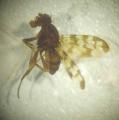Diptera.info :: Identification queries :: Diptera (adults)
|
A fly.
|
|
| Nikita Vikhrev |
Posted on 12-10-2005 19:53
|
|
Member Location: Moscow, Russia Posts: 9542 Joined: 24.05.05 |
10 okt, Moscow city, park, on fallen leaf, 4-5mm. Costal break with seta, arista, red eyes - like Drosophilidae. But I very doubt in this - too strong setae on thorax, too thin abdomen, too black-grey body colour. And fly acted like Sepsidae or some Janwillemomiidae...  
Nikita Vikhrev - Zool Museum of Moscow University |
|
|
|
| Paul Beuk |
Posted on 12-10-2005 21:57
|
|
Super Administrator Location: Netherlands Posts: 19403 Joined: 11.05.04 |
It is a species of Campichoeta, family Campichoetidae. I will have to check which one.
Paul - - - - Paul Beuk on https://diptera.info |
| Nikita Vikhrev |
Posted on 12-10-2005 22:47
|
|
Member Location: Moscow, Russia Posts: 9542 Joined: 24.05.05 |
Than Drosophiloidea (=Ephydroidea), and the very small family! Thank you very much Paul! P.S. Acting like Opomyzidae or Sepsidae also mean (for my expirience) to leave inside same squaire meter during long time even slightly disturbed. So I have a lot images from different points. Let me know, please, if you'll need some additional images for ID. Nikita Vikhrev - Zool Museum of Moscow University |
|
|
|
| Jan Willem |
Posted on 12-10-2005 22:56
|
|
Member Location: Waalwijk, The Netherlands Posts: 2167 Joined: 24.07.04 |
Hi Nikita, So you were close with your remark that is looked like Drosophilidae. Have a close look at the bristles on the frons at the eye margin. A. F bristle that is bend forward is not closer to the eye margin than closest backward bended F bristle => Drosophilidae - F bristle that is bend forward closer to the eye margin than closest backward bended F bristle => B B. Arista pubescent; one break in costal vein => Campichoetidae - Hairs on arista short or middle long; two breaks in costal vein => Diastatidae Maybe this will be of some help!? Jan Willem Edited by Jan Willem on 12-10-2005 22:57 |
|
|
|
| Nikita Vikhrev |
Posted on 12-10-2005 23:16
|
|
Member Location: Moscow, Russia Posts: 9542 Joined: 24.05.05 |
Thank you Jan. During the observation of Campichoeta I was in doubts - is it yours fly which I have to collect or not. Campichoeta decided to be not collected and vanished. And there was only one of a kind... Nikita Nikita Vikhrev - Zool Museum of Moscow University |
|
|
|
| Kahis |
Posted on 13-10-2005 11:23
|
|
Member Location: Helsinki, Finland Posts: 1999 Joined: 02.09.04 |
I would vote for Diastata (Diastatidae), possibly D. costata. The Campichoeta species I've seen are less robust and have quite small male genitalia. Edited by Kahis on 13-10-2005 11:24 |
| Paul Beuk |
Posted on 13-10-2005 11:31
|
|
Super Administrator Location: Netherlands Posts: 19403 Joined: 11.05.04 |
LoL, I was thinking of Diastata/Diastatidae and wrote Campichoeta/Campichoetidae. My first suspicion was probably Diastata costata, so I do not know how and when the other genus and family krept into my mind. Probably because they were once in the same family. Ah well, as long as we get the right name in the end... 
Paul - - - - Paul Beuk on https://diptera.info |
| Jan Willem |
Posted on 13-10-2005 16:45
|
|
Member Location: Waalwijk, The Netherlands Posts: 2167 Joined: 24.07.04 |
On the first photo there seems to be a rather distinct dark band along the costal margin, which would fit perfectly with Diastata costata (although this band is not always very distinct). So I agree with Kahis but would replace "possibly" by "probably". Jan Willem |
|
|
|
| Nikita Vikhrev |
Posted on 13-10-2005 19:15
|
|
Member Location: Moscow, Russia Posts: 9542 Joined: 24.05.05 |
I'd rather add two more images. May be it helps to illiminate both "possibly" and "probably". 
Nikita Vikhrev - Zool Museum of Moscow University |
|
|
|
| Jump to Forum: |













